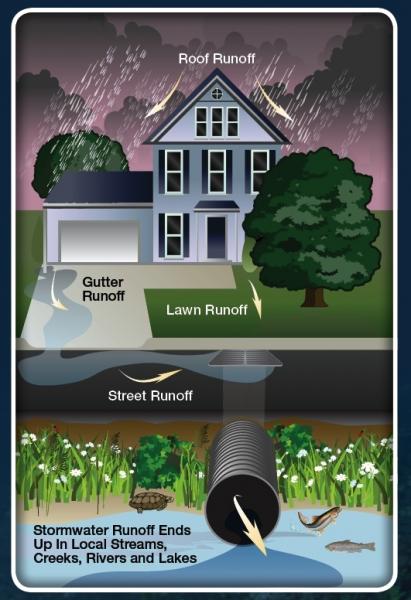Households
 Mass Outdoor Watering Conserve Tips
Mass Outdoor Watering Conserve Tips- Soak up the Rain
- Liquid Assets
- Handling Hazardous Household Products
Stormwater leaves your property in the form of runoff from driveways and lawns. Since this stormwater eventually reaches lakes and streams, every homeowner has a role to play in improving local water quality. Less water leaving your property means less pollution in the water bodies that serve as drinking water, recreational uses, and habitat. Here are some tips to help keep our stormwater clean:
- Remember: Only rain belongs in the drain!
Don't dump anything down storm drains. Be sure to clear away leaves and debris. - Wash your car over your lawn or gravel.
This allows the ground to neutralize the soap and grime from your car rather than sending it directly to our creeks and streams. Use biodegradable or non-toxic soap that is phosphate-free. You can also take your car to a commercial car wash where wastewater is either recycled or treated. - Keep your car well-maintained.
Fix any fluid leaks promptly and make sure to clean up any spills. If you perform your own automotive maintenance, automotive repair shops will accept 5 gallons of used motor oil per resident per day. A Town holds a special hazardous materials collection day once a year in the spring/summer. - Consider disconnecting your downspouts.
You can plant a rain garden to absorb stormwater runoff. You can also use a rain barrel to help collect runoff from your roof and gutters to be used on your lawn and garden. - Use lawn or garden chemicals sparingly.
Choose organic alternatives when possible and check the weather forecast to avoid applying them before a storm. - Mow your lawn less often.
Try to keep your lawn at least 3" in height to minimize weed growth, reduce the need for watering, and decrease the likelihood of pests. Leaving the clippings on the lawn can also help block weeds and retain moisture. Sweep your sidewalks and driveway rather than hosing them down. - Plant native, low maintenance plants and grasses.
They often have longer root systems, which reduce the amount of chemicals and water needed. Try seeding your lawn with Buffalo Grass (Bouteloua dactyloides) or Northern Dropseed (Sporobolus heterolepis). For native plant listings, try http://www.wildflower.org/plants or http://plants.usda.gov/java. - Minimize runoff by not over-watering your lawn and garden.
Keep sprinklers on a timer to avoid pooling water. - Clean up pet waste.
Bag up pet waste and dispose of it in the trash to prevent harmful bacteria from washing into local waterways. - Be sure to minimize the amount of ice-melt used.
Do not over-apply salt. Choose a more environmentally-friendly alternative when possible. - Consider minimizing impervious surfaces around your home.
Use bricks, gravel, cobbles, natural stone, or permeable pavers instead of asphalt or concrete when possible. - Make sure storm drain outfalls are not running in dry weather.→
A storm sewer system is designed to carry stormwater. If it hasn't rained in 72 hours, it should not be flowing. Call the Bellingham DPW if it does. - Do not drain your pool, spa, or fountain to a storm drain.
Allow chlorine to dissipate for several days. Test the water to ensure the residual chlorine is zero before slowly draining to a landscaped area. You may be able to drain to a sanitary sewer. - Keep your septic system well-maintained to prevent leaks.
A leaking septic system can leach harmful bacteria into storm sewer systems and local waterways. It is important to keep your system well-maintained to prevent costly repairs as well. - Walk, bike, or share a ride when possible.
Driving causes particulates to enter our air. This air pollution can contaminate our rain and end up in our streams and lakes. - Install a rain barrel or cistern to capture roof runoff.
This helps prevent stormwater from reaching waterways and reduces the potential for pollution.

